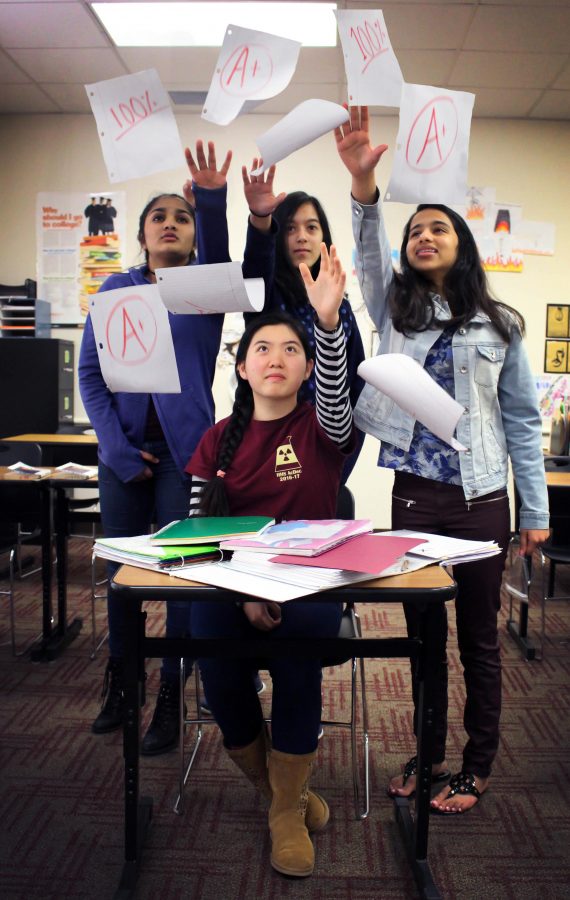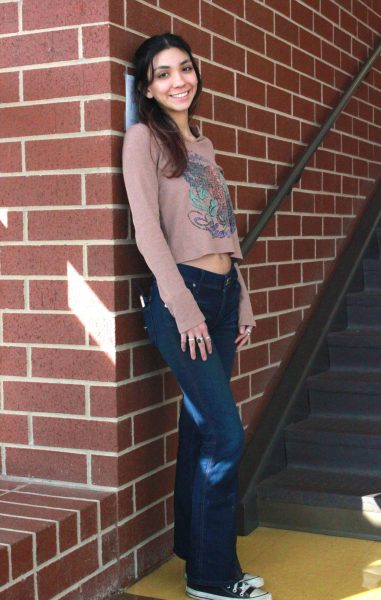Scholarly habits
Students compete for valedictorian spot in respective grade levels
To remain in good academic standing, senior Nancy Chen, junior Beenish Vallani, sophomore Yashna Gongal and freshman Samyuktha Kumar work to reach their highest potential. The students recognized the competition of the school’s GPA and rank list, and extra curriculars.
April 27, 2017
GreatSchools rated the district a nine out of ten based upon student academic proficiency this year. With such a high rating, four students understand the amount of work they have to commit to in order to be some of the top students in the district.
Freshman Samyuktha Kumar first noticed how goal-oriented the school was at the Business Professionals of America regional competition.
“We [students in BPA] are so aggressive,” Kumar said. “We dominated [the competition]. All of the other schools really wanted to beat us.”
Not only does Kumar pay attention to the ambitious feel, but also as to how goal-oriented she was individually.
“I am very competitive; my friends and I always have contests about grades and who has studied the most,” Kumar said.
Kumar made time during the week and over the weekends to work with peers to prepare for upcoming tests.
“I have study dates with my friends,” Kumar said. “Sometimes we FaceTime for two to three hours.”
Sophomore Yashna Gongal had a different way to prepare for tests.
“I usually look back at my notes and rewrite key points,” Gongal said. “I make myself a review sheet, which takes from about one to three hours.”
Gongal found missing school to interfere with her attempts to make straight A’s.
“The only times I miss school is whether I’m sick or have a doctor’s appointment,” Gongal said. “There are things I will have to make up and that can take up time, so I don’t really like to miss it.”
Junior Beenish Vallani spent most of her time scheduling around school.
“I think my social life revolves around academics,” Vallani said. “All of my friends do the same thing, so we [study] together.”
Vallani found it easier to excel when she would manage her time wisely between homework and studying, and social events.
“I try to get my work done over the weekend,” Vallani said. “Any other homework, I try to get done before the day it is assigned.”
According to senior Nancy Chen, the pressure to maintain a high GPA causes the competitive nature of the senior class.
“There are definitely a lot of people who try really hard,” Chen said. “It’s not malicious in intent, but everyone tries to one up each other, which sets an underlying tension that makes everyone want to be the best they can.”
Chen noticed how students would make sacrifices to maintain their GPA.
“Some kids in my class would take AP classes just to better their rank, not because they enjoyed the class,” Chen said. “I still took the classes that I wanted to, but I definitely had to work harder to maintain good grades.”
Chen experiences cases of stereotyping due to her race, without consideration for her intelligence and work ethic.
“I feel like people see the reasoning behind my GPA is my Asian heritage,” Chen said. “I feel as though it undermines all the work I’ve put in to my grades. I don’t like the boundaries people put around me. People expect me to know everything when I’m still learning just like everyone else.”
Upperclassmen compete to to be seen as a better candidate to universities of their choice.
“When going through the admission process, colleges look at ranks to determine whether I should get accepted,” Chen said. “It can really discouraging to students, so they try to give their all to seem better. If a school would reject me based off my GPA or rank alone, I feel like it wasn’t a worthy school anyways.”
Chen found that ranks were unhelpful in a person’s life after education.
“I feel like people shouldn’t use a number to determine themselves or how they identify themselves, in the long run, because no one’s going to care about a rank once we’re out of high school,” Chen said.




